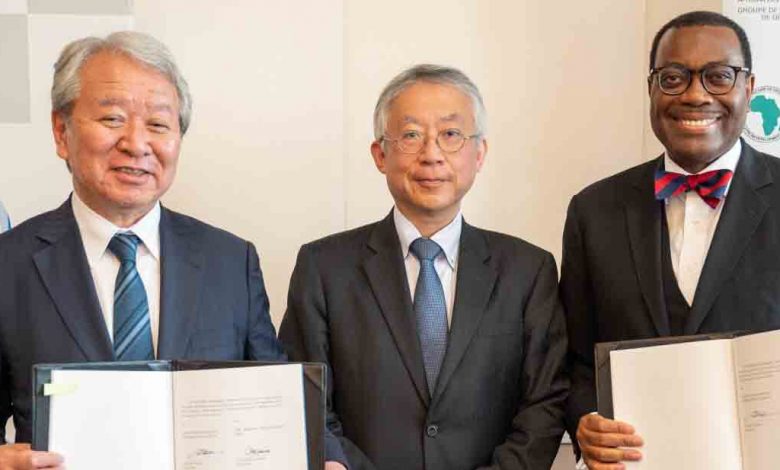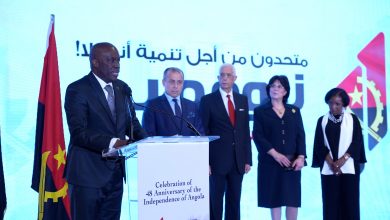African Development Bank Group, JICA sign $350 million loan deal to support African private sector | African Development Bank

Diplomat.Today
The African Development Bank
2023-04-25 00:00:00
——————————————-
The African Development Bank and the Japan International Cooperation Agency (JICA) today signed a JPY 44,100,000,000 ($350 million) loan to fund the bank’s support for private sector operations in Africa.
The loan is part of the Enhanced Private Sector Assistance (EPSA) initiative, which is part of Japan’s Official Development Assistance to Africa. The fifth version of EPSA, at a cost of $4 billion, was signed by the Bank and JICA at the Eighth Tokyo International Conference on African Development (TICAD 8), held in Tunis last August.
The signing ceremony for the private sector concessional loan took place at JICA’s Tokyo headquarters between JICA President Dr. Tanaka Akihiko and Dr. Akinwumi Adesina, President of the African Development Bank Group. Dr. Adesina is in Japan to discuss investment opportunities in Africa with senior government officials, major Japanese companies, development partners, parliamentarians and the African diplomatic corps.
Dr. Tanaka said the loan was a critical step in Japan’s effort to partner with the African Development Bank to support Africa as it faces the challenge of navigating multiple compound crises, including issues of debt sustainability and the impact of the war in Ukraine.
He said: “The private sector in Africa is fundamental to creating jobs for Africa’s prosperity and progress. While the private sector has faced unprecedented economic and social pressures, we are confident that the bank’s non-sovereign operations, supported by this concessional loan, will play a vital role in addressing these pressing issues.”
Dr. Adesina thanked both the government of Japan and JICA for their continued support to the Bank and Africa.
He invited JICA to collaborate with the African Development Bank Group in other critical areas, such as refining the food and agriculture supply pacts developed by African countries at a food summit in Senegal in January to address food insecurity on the continent. to take.
“JICA’s support would be crucial in the implementation of the Special Industrial Zones for Agricultural Processing, which will be the biggest breakthrough in African agriculture. It will transform rural economies, reduce food losses, process and add value to crops produced in rural areas, and create jobs,” added Adesina.
“Support young people to go into farming. Young people are Africa’s greatest asset, but they have no access to finance. The bank establishes youth entrepreneurship investment banks to provide financial and technical support to young people throughout the business cycle,” Adesina insisted.
Dr. Tanaka agreed with the areas raised by the African Development Bank chief, saying they were important to Japan’s agenda for future cooperation with Africa.
On the need to create jobs for young people, the JICA president said: “It is foolish not to take advantage of active young people in Africa. In Africa you have an abundance of young people, but in Japan we have an abundance of the elderly.”
Dr. Tanaka said it was important to explore ways to promote interaction between Japanese university students and those from Africa to promote the exchange of knowledge and skills. He agreed that JICA should hold further discussions with the African Development Bank Group to explore other issues raised by Adesina, including digitization of primary health care operations and the establishment of the African Pharmaceutical Technology Foundation which will be housed in the capital of Rwanda, Kigali.
JICA and the African Development Bank signed the first private sector aid loan in 2007. To date, the Bank and the Government of Japan have signed eight non-sovereign loans totaling $1.85 billion. The loans have so far helped support 51 projects, primarily credit lines and equity to regional development finance institutions, private equity funds and project finance for public-private infrastructure partnerships.
Japan’s support to Africa, through the African Development Bank Group through EPSA, consists of three main components: a solid co-financing facility under the Accelerated Co-financing Framework Agreement; the Fund for African Private Sector Assistance, which has been instrumental in providing technical assistance and expertise to project sponsors across Africa in a variety of sectors, and the Private Sector Investment Finance.
The government of Japan is one of the Bank’s biggest supporters. It contributed to the bank’s largest-ever overall capital raise in 2019. In December 2022, Japan provided $534 million to the African Development Fund’s $8.9 billion sixteenth replenishment.
——————————————-



